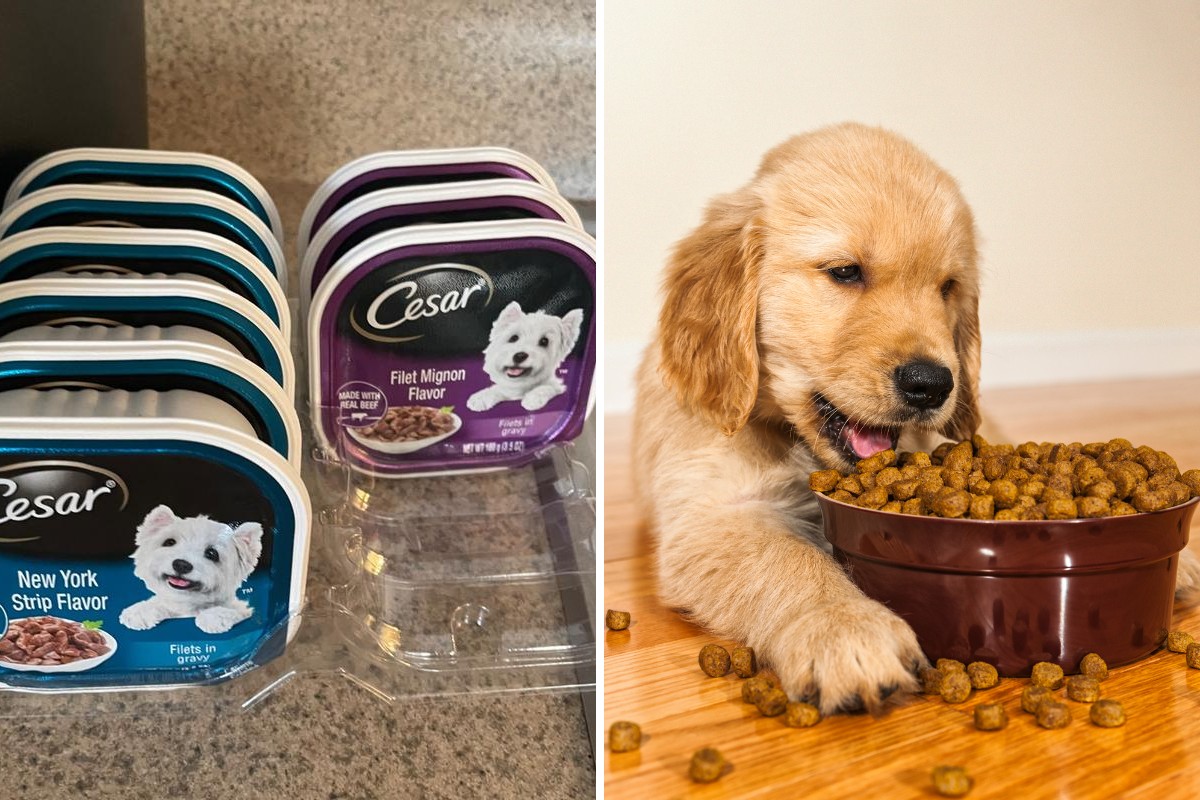 6 Nov
6 NovCan Puppies Eat Cesar Dog Food?
If you’ve ever found yourself wandering the pet food aisles, you’ve probably paused at the selections of Cesar Dog Food. It’s known for its appealing packets, wide variety, and the way it makes our adult dogs wag their tails in anticipation. But the question we’re tackling today is, “Can puppies eat Cesar Dog Food?”
Yes, puppies can eat Cesar Dog Food, specifically the formulas designed for puppies. These products cater to the nutritional needs of growing dogs, providing a balanced diet that supports their development. When choosing Cesar Dog Food for your puppy, look for “puppy” labeled on the packaging to ensure it’s formulated for young dogs.
When it comes to our pups, we all understand that proper nutrition is the cornerstone of a healthy life. It’s the fuel that powers their playful sprints and the building blocks for their growing bodies. And as Cesar Dog Food is a frequent choice for many dog owners, it’s important to examine whether it’s suitable for the unique dietary needs of our puppies.
In the next few minutes, we’ll explore everything from the specific nutritional requirements of puppies to how Cesar Dog Food fits into this picture. We’ll go beyond just a simple ‘yes’ or ‘no’ and provide you with a nuanced view that you can trust. So, grab your cup of coffee, settle in with your pup by your side, and let’s get to the heart of your puppy’s diet.

Understanding Puppy Nutrition
Essential Nutrients for Puppies’ Growth and Development
Puppies require a delicate balance of nutrients to thrive. High-quality protein is crucial for muscle growth and repair, while fats provide energy and aid in brain development. Carbohydrates deliver sustained energy and are important for digestive health.
Moreover, a range of vitamins and minerals support their immune system and bone growth, with calcium and phosphorus being particularly vital for healthy teeth and bones. DHA, an omega-3 fatty acid, is also key for cognitive and retinal development. It’s these nutrients, in the right proportions, that will set the foundation for a puppy’s overall well-being.
The Difference Between Puppy Food and Adult Dog Food
The major distinction between puppy food and adult dog food lies in its nutritional content. Puppy food is enriched with more proteins and fats to meet the demands of their growing bodies and higher energy levels. Additionally, it often contains specific nutrients to support development, such as DHA for brain and vision health.
Adult dog food, on the other hand, has a nutritional profile aimed at maintaining health rather than promoting growth. It typically has lower calorie content to suit their slower metabolism and prevents overfeeding, which can lead to obesity.
How the Right Diet Affects a Puppy’s Health Long-Term
Feeding your puppy the right diet has profound long-term effects on their health. A diet that’s well-balanced with the appropriate nutrients can promote optimal growth and prevent developmental orthopedic diseases. Proper early nutrition also sets the stage for a healthy weight and can reduce the risk of chronic conditions like diabetes and heart disease.
Moreover, a good diet can influence a puppy’s immune system strength, leading to a robust adult dog more capable of warding off diseases. Just like in humans, a balanced diet in the formative years paves the way for a healthier life ahead for our canine companions.
Pros and Cons of Feeding Cesar Dog Food to Puppies
Advantages of Choosing Cesar Dog Food for Puppies
Feeding your puppy Cesar Dog Food which is specifically formulated for puppies can have several benefits:
- Tailored Nutrition: Cesar puppy formulas are designed to meet the higher nutritional demands of growing dogs, providing a good balance of proteins, fats, and other nutrients essential for development.
- Taste Appeal: Known for its palatability, Cesar Dog Food often appeals to picky eaters, ensuring that your puppy is eager to eat and receives the necessary nutrition without fuss.
- Convenience: Pre-portioned and easy to serve, Cesar Dog Food can save time for pet owners, making meal prep simpler and feeding times mess-free.
- Variety: Cesar offers a range of flavors and textures, which can help in introducing puppies to different tastes and reducing future food aversions.
Possible Concerns or Downsides
However, there are also some considerations to keep in mind before deciding on Cesar Dog Food for your puppy:
- By-Products and Fillers: Some pet owners are concerned about the inclusion of by-products and fillers in dog foods, which may not provide the highest quality nutrition available.
- Specific Needs: Not all puppies may thrive on Cesar Dog Food if they have specific dietary needs or sensitivities that require a more specialized diet.
- Cost: Depending on your budget, Cesar Dog Food can be more expensive than other brands, especially if feeding larger breed puppies who require more food.
Alternatives to Cesar Dog Food for Puppies
Homemade Puppy Diets and Their Benefits
For those looking for a more hands-on approach to their puppy’s diet, homemade meals could be a beneficial alternative:
- Customization: Homemade diets allow you to tailor meals to your puppy’s specific nutritional needs, preferences, and any medical conditions.
- Freshness and Wholesomeness: Preparing food at home ensures the use of fresh ingredients without preservatives, which can be healthier for your puppy.
- Variety: You can offer a wide range of foods, reducing the risk of developing food intolerances and allergies by avoiding the over-representation of a single protein source or ingredient.
- However, it’s crucial to consult with a veterinary nutritionist when opting for homemade diets to ensure they are balanced and suitable for a puppy’s growth needs.

Other Commercial Puppy Food Options
There is a plethora of commercial puppy foods available that can serve as alternatives to Cesar Dog Food:
- Kibble (Dry Food): Many brands offer puppy-specific formulas that are nutritionally complete and often beneficial for dental health.
- Canned (Wet Food): High in moisture and often more palatable, which can be good for hydration and picky eaters.
- Raw Diets: Some pet owners choose commercially available raw diets that aim to mimic a dog’s natural ancestral diet.
- Dehydrated or Freeze-Dried: These options are less processed than traditional kibble and can be a middle ground between raw and traditional diets.
- Each of these alternatives comes with its own set of benefits and may suit different puppies depending on their individual health needs and your lifestyle.
What to Look for When Choosing a Puppy Food
When deciding on the best food for your puppy, consider the following:
- AAFCO Statement: Ensure the food meets the nutritional levels established by the AAFCO for growth or all life stages.
- High-Quality Protein: Look for whole meat or a named meat meal (like chicken meal or fish meal) as the first ingredient.
- Balanced Omega Fatty Acids: These are crucial for healthy development, particularly DHA for brain and eye health.
- Calcium to Phosphorus Ratio: This should be appropriate for growing puppies to support bone health.
- No Fillers or Artificial Additives: Avoid foods with excessive fillers, artificial colors, flavors, or preservatives.
- Reputation and Transparency: Choose brands with a strong reputation for quality control and transparency regarding their ingredient sourcing and manufacturing processes.
Tips for Choosing the Right Dog Food for Your Puppy
Choosing the right food for your puppy is paramount for their development and overall health. Here are some tips to help you make the best choice:
Considering Your Puppy’s Specific Needs
- Breed Size: The nutritional needs can vary significantly between small, medium, and large breeds. Pick a formula that is tailored to your puppy’s breed size to ensure proper growth rates.
- Activity Level: Active puppies may require food with higher calorie content to sustain their energy levels.
- Health Conditions: If your puppy has specific health issues, such as allergies or digestive sensitivities, seek out foods formulated to address these concerns.
- Growth Stage: Puppies go through several growth stages. A diet suitable for a 3-month-old might differ from that of an 8-month-old pup.
The Role of Your Veterinarian in Choosing Puppy Food
- Expert Guidance: Veterinarians can provide personalized recommendations based on their assessment of your puppy’s health, weight, and growth curve.
- Nutritional Counseling: They can help decipher the myriad of food choices and suggest diets tested and proven for efficacy and safety.
- Health Monitoring: As your puppy grows, your vet can ensure that their diet continues to meet their changing nutritional needs.
Reading and Understanding Dog Food Labels and Ingredients
- Ingredient List: Ingredients are listed by weight, so look for high-quality proteins like chicken, beef, or fish to be listed first.
- Guaranteed Analysis: This gives you the minimum or maximum levels of nutrients like protein, fat, fiber, and moisture.
- Nutritional Adequacy Statement: This indicates whether the food is a complete and balanced diet for a certain life stage.
- Manufacturer Information: A reputable brand will provide contact information for consumer inquiries.
- Expiration Date: Always check to ensure the food is fresh and not close to expiring.
- By-Products and Fillers: Be mindful of by-products, artificial flavors, colors, and preservatives, which may not be desirable for your puppy’s diet.
- AAFCO Standards: Look for foods that comply with the standards set by the Association of American Feed Control Officials.




